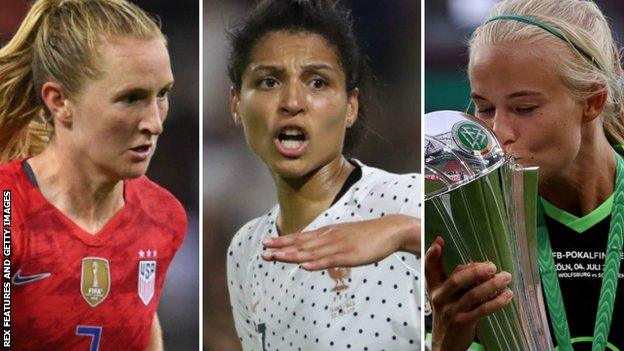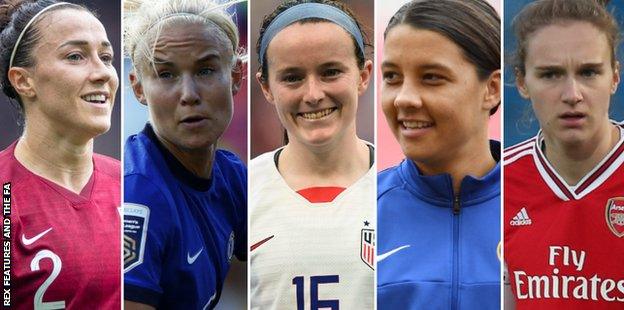Women's Super League: Foreign stars raise bar but will English youngsters suffer?
- Published

The United States' Sam Mewis, France's Valerie Gauvin and Denmark's Pernille Harder are among the 50 non-English players to sign for WSL clubs so far this summer
The 2020 summer transfer window was like no other in women's football history with a huge array of international players signing for Women's Super League clubs prior to Thursday's deadline. The window shut at 17:00 BST for domestic deals.
To many, it's a mark of the league's success and growing global appeal, epitomised by the fact that the two Manchester clubs have, between them, signed four members of the United States' World Cup-winning squad, while Chelsea have acquired arguably Europe's best player - Pernille Harder from Wolfsburg.
Yet of the 73 new signings made by WSL clubs this summer, just 23 have been English.
While the overseas arrivals will excite fans and surely boost the league's profile, how badly will the influx of foreign stars limit the first-team opportunities given to young English talent?
Where are this summer's WSL signings from?
Despite the WSL transfer window for domestic deals being closed, international deals can still be made until 00:00 BST on Friday.
No fewer than 21 nationalities are represented in the signings made so far this summer by WSL clubs:
23 English players
Six Australians
Six Scots
Five Germans
Four from the United States
Four from Denmark
Three from Norway
Two from each of Canada, France, New Zealand, Northern Ireland, South Korea, Spain, Switzerland and Wales
And one from each of the Czech Republic, Finland, the Netherlands, Portugal, the Republic of Ireland and Sweden.
In total, 34 are from the United Kingdom and 39 (53.4%) are not, while 57 are from Europe and 16 (21.9%) are from further afield.
The new arrivals from all over the globe have undoubtedly helped the WSL secure new broadcasting deals in Germany, Italy and the United States, to add to existing deals in Scandinavia, Central America and Australia.
Is the WSL now the best league in the world?
This summer's big-name foreign arrivals have followed quickly after last winter's signing of Australia captain Sam Kerr by Chelsea. More and more top players now choosing the WSL, when previously it was the American clubs, plus European champions Lyon, who seemed to have a monopoly on the best talent.
So why do so many players now feel that England is the place for them?
France's attacking midfielder Kenza Dali, who joined West Ham United in 2019, said: "Everyone wants to play in England.
"I mean, the league is going to be really hard. When you play in the French league, you already know you're going to have two levels: Lyon, PSG, Montpellier and the rest. In England it is completely different.
"Every game is really hard and as a player you are looking for a league like this. You don't know who is going to win the league or who is going to be last.
"When you speak to a male player, they want to play in England and it's starting to be the same with the women."
When asked why she moved to the WSL, Australia midfielder Ella Mastrantonio - a new signing for Bristol City - said: "Europe is really booming for women's football right now and I think the WSL is one of, if not the best league in the world.
"Just look at all the signings that are coming over, all the best players in the world are attracted to the league."

In Lucy Bronze, Pernille Harder, Rose Lavelle, Sam Kerr and Vivianne Miedema (left to right), five of the top 10 players listed in the Guardian's 'best 100 female footballers in the world from 2019' now play in the WSL
Impact on English youngsters' game time 'inevitable'
But will the multitude of new arrivals have an impact on the amount of game time afforded to England-qualified players?
Asked if, despite boosting the league's profile, the new overseas arrivals would take away opportunities for the development of young English talent, Aston Villa defender Anita Asante told BBC Radio 5 Live: "Absolutely, I think it will to some degree, I think that's inevitable.
"The top clubs are driving the standards in terms of the professional game - you're going to pull in the best talent across the world.
"It might make it a bit more challenging for those youth players to really get that first-team experience that players used to get.
"That's a challenge and a balance that clubs are going to have to strike, depending on their own philosophy. Clubs aren't always geared towards national team development either."
The issue is one the Football Association are mindful of and it was confirmed on Wednesday that a new homegrown players quota has been agreed from the 2021-22 season, meaning that - from, next season - at least eight of a club's 25-player squad must have spent at least three years training in England prior to their 21st birthday.
The FA hopes to increase that quota further in future years, however, no such rule will be in place this term and - even when it does come in to force - it will not stipulate the number of homegrown players who must feature in the matchday squad.
Asked whether she was concerned about the impact this summer's non-English signings might have on young English players, Kelly Simmons, the FA's director for the women's professional game, replied: "It's one to watch, for sure. It's something that we've been talking to the clubs about and the board.
"We are increasing the number of loans, to give the clubs a chance, and that comes in this season, to make sure that young talent who are maybe not getting on [the pitch] can go out on loan and get key game time, which is so important for their development.
"We're doing a review as well; we've got four pilot clubs where we are reviewing our player pathways. So, alongside rules, we've got to make sure we're producing top, top talent, so we get this blend of English and [foreign] world-class talent."
All figures are correct as of 17:00 BST on Thursday, 10 September, but do not take in to account any signings announced after this time. An earlier version of this article was published on 3 September.